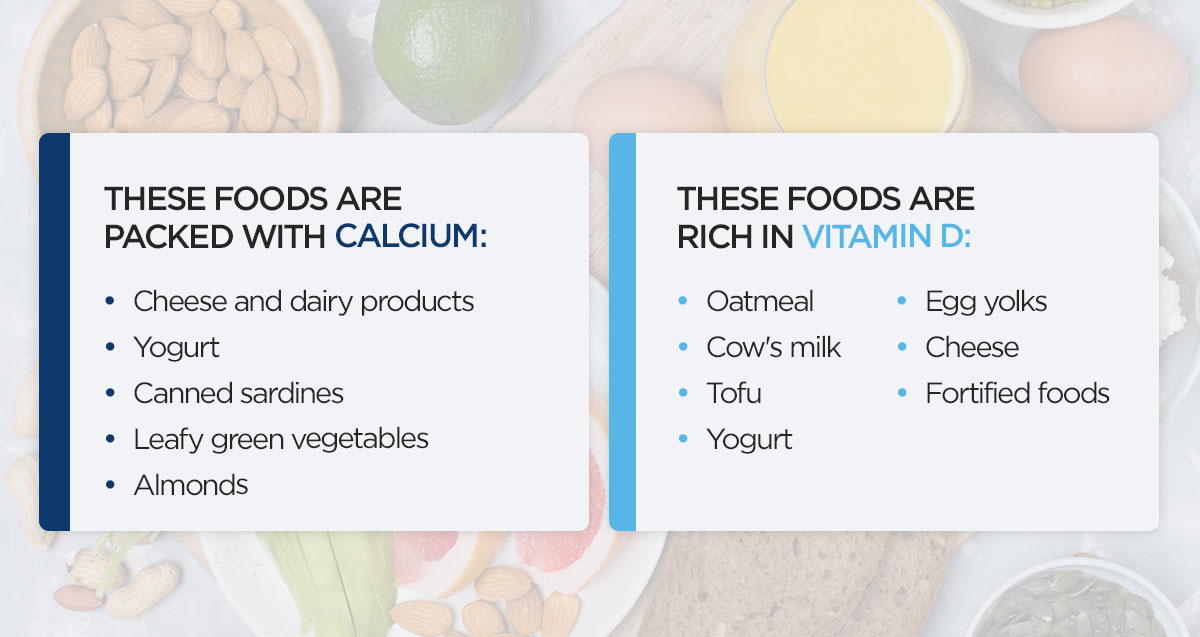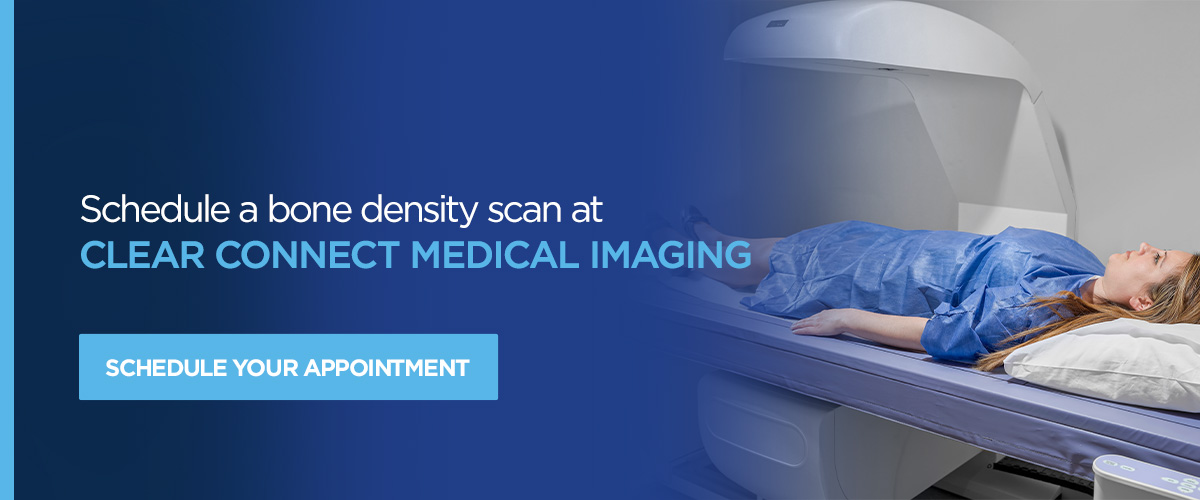Can Your Diet Improve Bone Health?

Of the many components that comprise the human body, bones play a key role in providing shape and support. They protect internal organs and provide an anchor for muscles, facilitating movement and supporting the body’s structure. They also store and release essential minerals.
Bones need certain minerals and nutrients to form in childhood, and similar nutrients are essential to maintaining strong, healthy bones in adolescence and adulthood. As a result, diet plays a critical role in maintaining bone health.
Jump sections:
- Diet does improve bone health
- What to consume to build healthy bones
- Helpful foods
- Foods to avoid
- Decreased risk of osteoporosis
- Choose Clear Connect Medical Imaging for diagnostic tests
- Schedule a bone density scan at Clear Connect Medical Imaging
Diet does improve bone health
Bones are made of protein, collagen and minerals. While collagen provides the structure, minerals like calcium harden the bone. Each bone also has two types of tissue — a dense outer shell known as the compact bone and a less dense, spongy tissue known as cancellous tissue that is filled with bone marrow. Without enough nutrients, density will decrease.
Bone density refers to the amount of material contained within a specific volume. Bone density scans use x-ray technology to determine whether bones contain adequate or insufficient amounts of bone material. These scans determine material volume by measuring calcium and mineral level content.
Healthy, strong bones have a high mineral content. In contrast, a low mineral content can lead to low density, which can cause the holes within the spongy tissue to widen and weaken. Low mineral content will also lead to thinning of the dense outer shell. As tissues become more fragile, the risk of fractures increases. Low density may also indicate osteoporosis, a medical condition that results in brittle, fragile bones.
While low bone density can be the result of a lack of nutrients, it may also indicate medical conditions like osteoporosis. This medical condition can stem from diet, hormonal changes and other risk factors like family history. A nutritious diet can decrease the risk of osteoporosis by boosting density.
What to consume to build healthy bones
Diet and nutritional intake impact every aspect of overall health, including the bones. Adding the right foods to your diet can improve and maintain bone health.
Calcium plays a key role in bone formation and maintaining healthy bone density, while vitamin D enables the body to absorb calcium. Magnesium and phosphorus are minerals found in bone crystals. Protein, zinc, phosphorus, vitamins A, K, C, B-group, copper and iron are all essential nutrients that play key roles in bone health. A healthy amount of these nutrients can protect bones and prevent osteoporosis. Protein is also vital for bone health as it helps repair body tissues while supporting healthy growth.
While there are numerous supplements on the market that can aid nutrient intake, it’s always best to get nutrients from healthy foods because foods are easier for the body to absorb.
Helpful foods
A healthy diet that includes a variety of nutrient-dense foods can help protect against malnutrition in all forms, including nutrient deficiencies that negatively impact bone health. Foods that offer a rich source of calcium can support bone health, while foods that provide vitamin D ensure your body can absorb the calcium.

These foods are packed with calcium:
- Cheese and dairy products
- Yogurt
- Canned sardines
- Leafy green vegetables
- Almonds
The recommended daily intake of calcium ranges between 1,000 mg and 1,300 mg, depending on age and gender. Infants up to 12 months should consume at most 260 mg of calcium per day.
These foods are rich in vitamin D:
- Oatmeal
- Cow’s milk
- Tofu
- Yogurt
- Egg yolks
- Cheese
- Fortified foods
The recommended daily intake of vitamin D ranges between 10 and 20 micrograms (mcg), depending on age and gender.
Foods to avoid
While some foods can support healthy bones, other foods can harm bone health:
- Fizzy drinks: Carbonated soft drinks may be tasty, but they are widely responsible for obesity and health conditions like diabetes. The consequences of consuming these sugary beverages can also negatively impact bone health. Carbonated drinks contain phosphoric acid, which can reduce calcium content in bones.
- Coffee: A cup of coffee a day may generally hold no significant health risks, but too much can negatively impact the body’s ability to absorb calcium properly. Excess caffeine can also cause side effects like insomnia, anxiety and dependence.
- Alcohol: High alcohol consumption harms health in numerous ways. Beyond weakening heart muscles and increasing blood pressure, heavy drinking can degrade bone health and homeostasis. Alcohol impacts liver and pancreas functions, hindering the body’s ability to absorb calcium and other minerals essential for healthy bones.
- Hydrogenated oils: Packaged snacks and fried foods often contain hydrogenated oils to keep foods fresher for longer. These oils are made by adding hydrogen to vegetable oil, which depletes vitamin K content.
- Foods high in sodium: While the body needs sodium for normal muscle and liver functions, too much sodium can impact calcium absorption rates and degrade bone health in the process. Ideally, it’s recommended to consume no more than about 1 teaspoon per day.
Decreased risk of osteoporosis
Osteoporosis is a medical condition that degrades bone health by weakening tissues. While poor nutrient intake can increase the risks of developing this condition, our bones lose density naturally as we age. As a silent disease, osteoporosis can go unnoticed until fractures occur. This condition affects an estimated 10 million people in the United States and is more common in individuals over the age of 50.
Osteoporosis can cause height loss, changes in posture and chronic lower pain pain. These symptoms can be difficult to identify. Bone density tests are an effective way to diagnose this condition. Diet and proper nutrient intake can decrease the risk of developing osteoporosis. Routine physical exercise can also help.
Choose Clear Connect Medical Imaging for diagnostic tests
Clear Connect Medical Imaging combines state-of-the-art diagnostic technologies with quality superior expertise and patient care. Our privately owned imaging centers offer efficiency and highly trained staff. We strive to revolutionize imaging center standards by prioritizing professional development and incorporating the latest technologies.
Our imaging centers accept most major insurance plans, even those that require pre-authorization and referral. Our network of referring physicians can assist in this regard.
Schedule a bone density scan at Clear Connect Medical Imaging
Certain nutrients can boost and support bone health. Incorporating the right foods into your diet can improve bone health and reduce the risk of developing medical conditions like osteoporosis.
If you are concerned about your bone density, schedule a bone density scan at Clear Connect Medical Imaging. Find a location near you to get accurate insight into your skeletal health.



